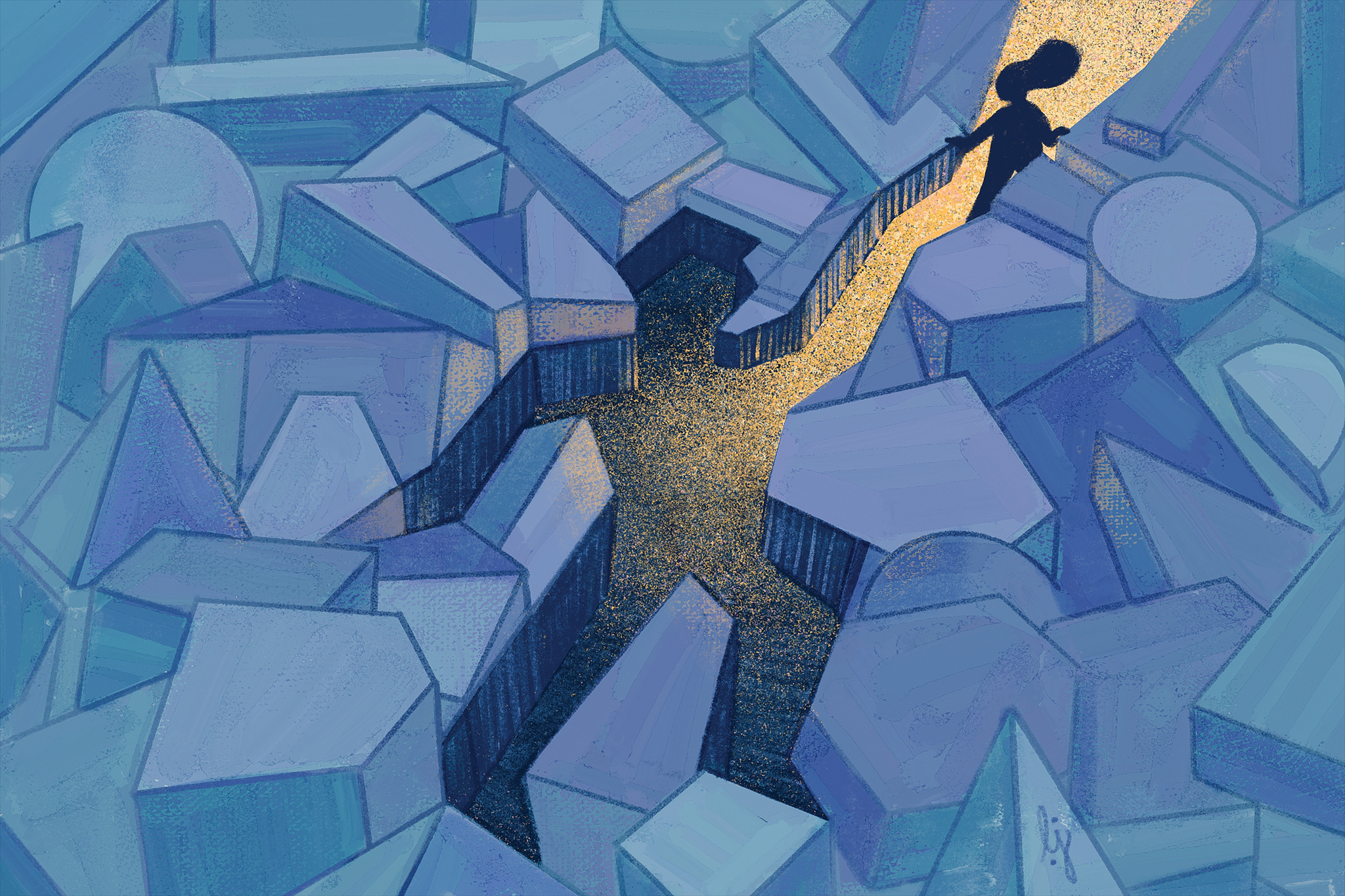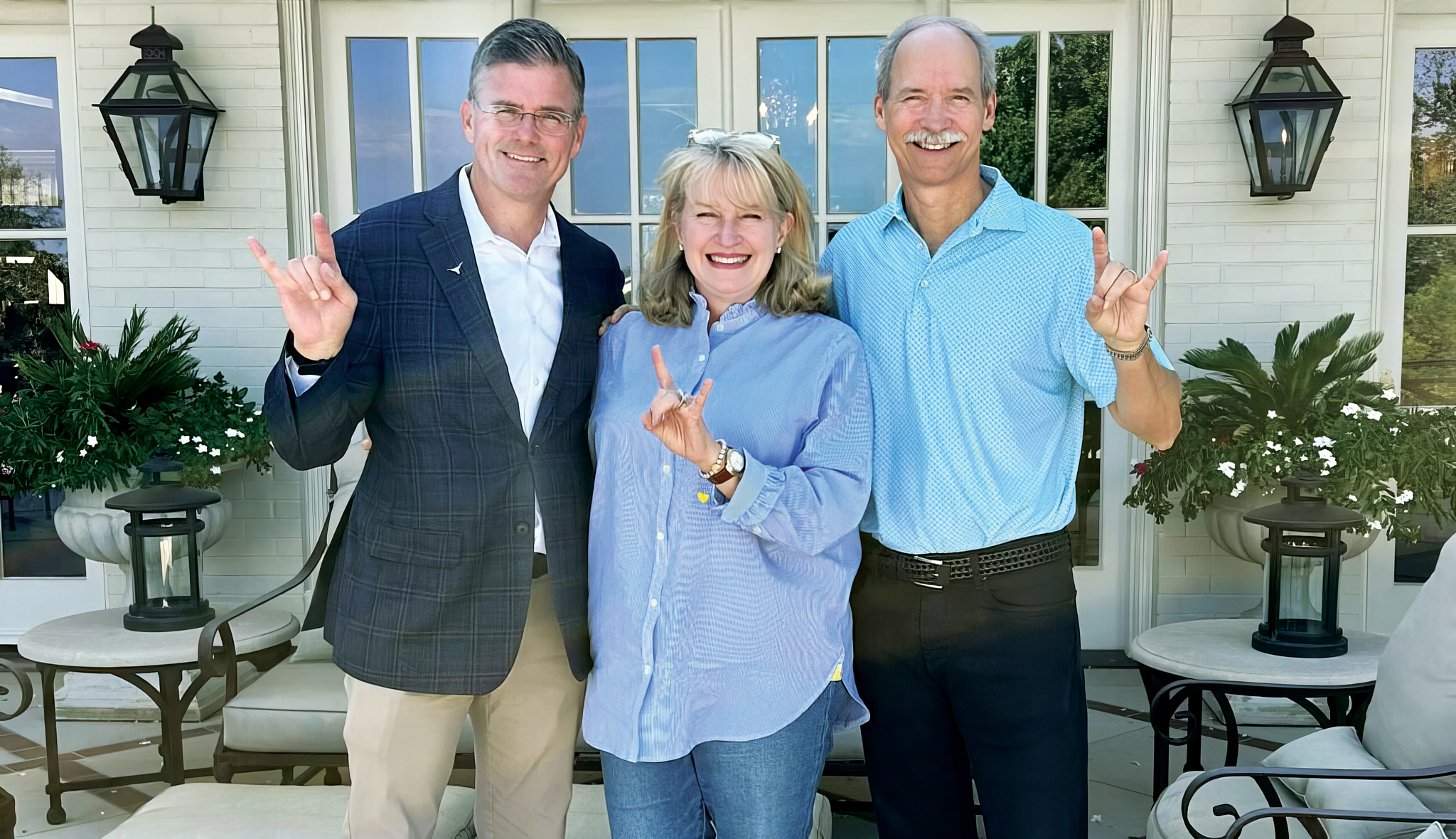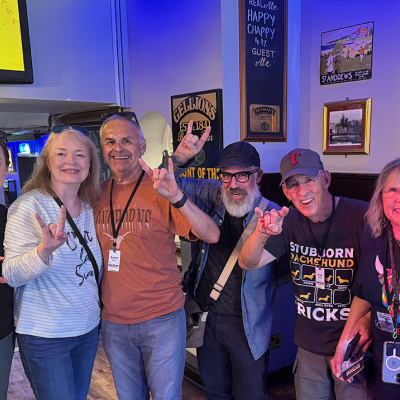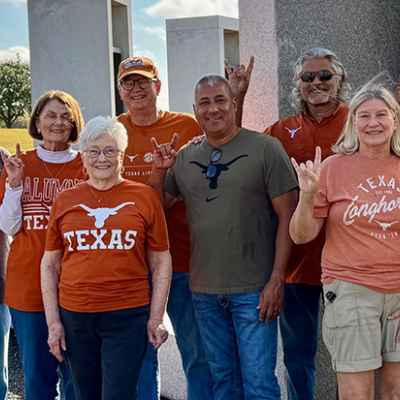The Moritz Center Supports Life-Changing Social Work

During the summer of 2021, an 85-year-old man with a shock of white hair and a surfer’s tan lay in his bed in Arlington making his last stand against cancer. His name was David Moritz, and he was a leading citizen who had built an impressive collection of auto dealerships and became a major philanthropist in North Texas.
Seated next to Moritz was a social worker from a hospice agency. “She had such an impact on our family,” says the man’s son, John David Moritz. “She sang to us. She stroked my father’s hands and comforted him, and that stuck with us more than anything else about that whole experience. It just reinforced to us the importance of social work.”
“We’ve always been supportive of social work,” especially in the causes of reducing homelessness, says Moritz, who, with his wife, Leslie, established the Moritz Family Student Support Fund and has given $1.2 million to support collaborations between the Dell Medical School and the Steve Hicks School of Social Work at The University of Texas at Austin. “But that really hit home personally in that room, and we realized these people are just amazing. God bless them for it, because it’s not the highest-paying career out there, and they just have a servant’s heart.”
It was the Moritzes’ daughters, Meg, BA ’19, Life Member, and Anna, a senior in the Moody College of Communication, who brought the couple into close contact with UT. “It’s such a terrific University … You get involved with the people down there like Dean [Allan] Cole, and you want to do whatever you can with those people who are making a difference,” Moritz says.

In the summer of 2023, UT’s nascent Center for Societal Impact was named for the Moritz family in recognition of a $5 million gift. The center had been developing since June 2022, when Cole was named dean of UT’s School of Social Work. Previously, he had served as deputy to the president for societal challenges and opportunities.
Since “societal impact” could describe everything a university does, defining the center’s role is important. “Does it meet the test of a critical social problem, a widespread challenge to our human thriving?” Cole asks. His previous assignment in the Office of the President was to work on the overlapping areas of homelessness, mental health, and affordable housing, specifically in Austin. While those remain priorities for the Moritz Center, the list of “strategic domains” has grown. The new center’s focus areas include aging, disability, children and families, health and technology, housing, and ethics.
Cole recognizes that ethics is a bit of an outlier. “It’s not a population—it’s a value … We are simply bringing something that’s implicit in our work—purposeful inclusion of ethical frameworks—to a more explicit, featured place in the work we do.”
To lead the center, Cole called on Jeanette Davidson, a seasoned educator in social work whom he met when he was a graduate student at Columbia University. Though the center is in the School of Social Work, with an advisory board of UT senior-level leaders (deans and vice presidents), it is currently adding faculty affiliates from numerous colleges, schools, and units.
It’s also forming a board of ambassadors made up of stakeholders from outside the University who are engaged in work that has an impact on social problems and who will serve as what Cole calls additional “wisdom bearers” and advisers. Establishing these groups of stakeholders reflects Cole’s preference for collaborative and broad-based leadership as well as interdisciplinary research.
The Moritz Center’s first major project came when the Texas Legislature awarded the center $12 million to help improve the rate at which foster children get permanently adopted. The strategy is remarkably simple: Take something that is working locally and scale it up statewide.
That idea that is working is Heart Galleries of Texas, a concept pioneered by the nonprofit organization Partnerships for Children. Heart Galleries uses professional portraits to connect children whose parents’ parental rights have been terminated to potential adoptive families. Since 2014, more than 400 children featured in the Heart Gallery of Central Texas have been adopted, making the Central Texas adoption rate an average of 22 percent higher than that of the rest of Texas year-over-year for the past decade.
The Moritz Center brought in the longtime director of Partnerships for Children, Kori Gough, who now serves on the center’s staff as the Heart Galleries of Texas director. The center will facilitate collaborative efforts to develop strong and thriving local Heart Galleries within the 11 regions across Texas.
“We talk about changing lives and having an impact, and this is a program where that’s just really clear,” Davidson says. “There’s nothing more important for children than to have a permanent home. This work is changing lives, and it’s saving lives.”
The Heart Galleries of Texas is, of course, only the first of many initiatives. The Moritz Center just posted a request for proposals for what it is calling Projects for Societal Impact. Anyone at UT Austin can propose a project in any of the domains listed. These projects will take place during summers and bring together faculty members, students, and community partners.
What’s distinctive about the Moritz Center for Societal Impact, says the dean, is its model: faculty, students and community partners creating opportunities to research and solve critical social problems, with an emphasis on immediate impact.
“Why do it if not for that?” Moritz says. “I want to make a difference as soon as I can make a difference.”
Davidson adds, “It sounds like a very lofty goal—to be the most impactful research university in the world … I’m blessed with this opportunity to try to pull researchers, students, and partners together to really make an impact. We also hope other states will be interested in what we’re doing and try to emulate this work.”
Asked about his vision for the center, Cole says: “In five years, I’d love for it to be fully endowed, which means we could fund in perpetuity the kind of work we’re doing … I’d love for the Moritz Center to be top of mind when it comes to where we go to find more information about what’s being done in the most cutting-edge, innovative ways in the research space, where the goal is a real, substantive, and positive change in the world.”
Read the full story at news.utexas.edu.
CREDITS: Illustration by Luisa Jung; photo courtesy of University Communications





